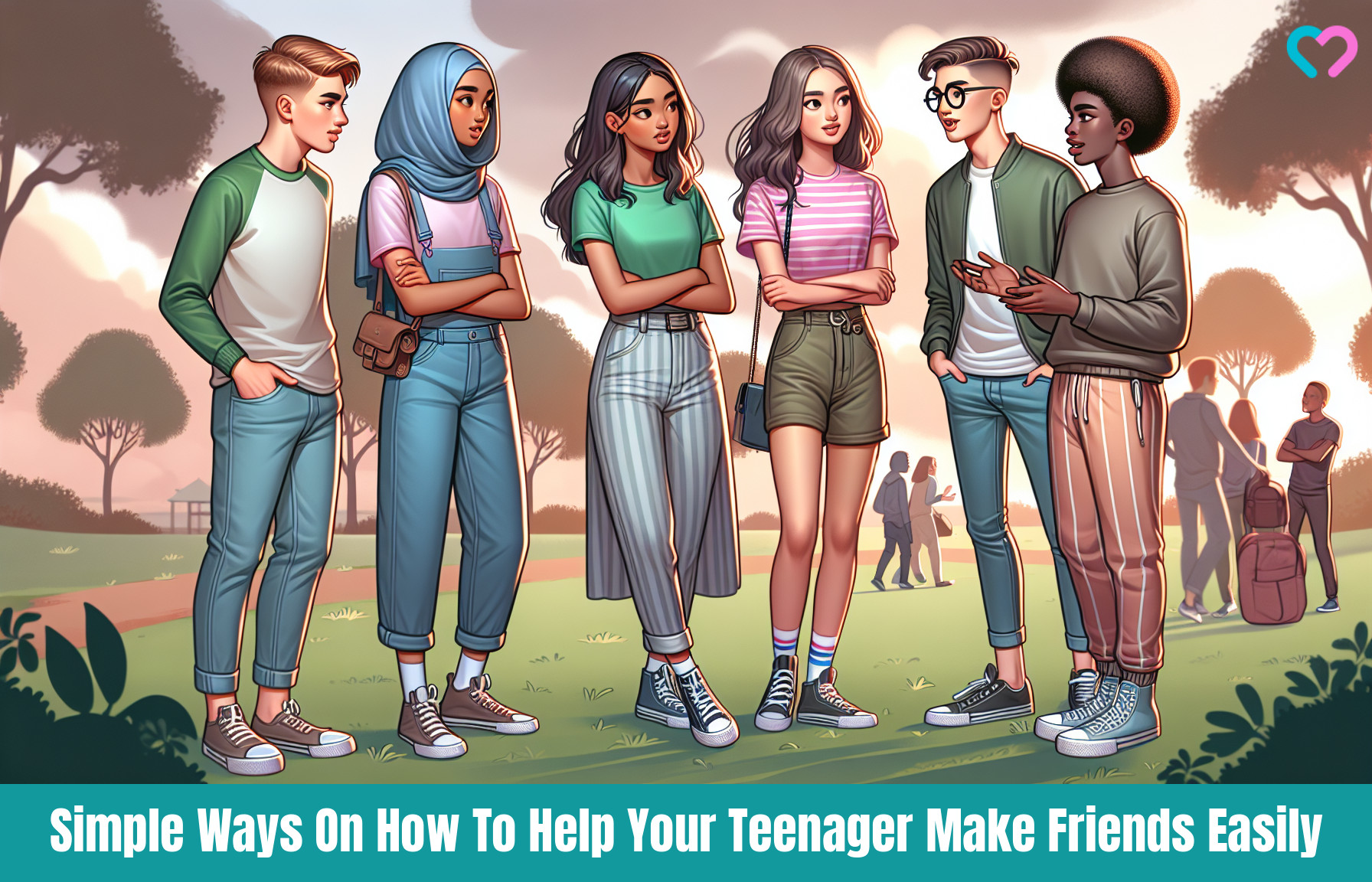
Image: Shutterstock
It is normal for some teenagers to be introverted and shy. However, this often makes it difficult for them to socialize. If your teen appears to be socially awkward, it may make you wonder how to help your teenager make friends easily.
Friends are an important part of our lives. We tend to share some things only with them and find a sense of comfort and support in their presence. Hence, if your teen seems to be alone most of the time, you can encourage them to go out and engage in different activities. This will help them gradually talk to people and make some friends.
Scroll through to learn about other ways you can help your teenager open up to people and make friends.
Simple Ways To Help Your Teen Make Friends Easily
1. Boost His Confidence:=
Growing teens tend to be more self-conscious, and need someone to boost their morale on a regular basis. Praise your teen often for what they do, and offer a little constructive criticism along the way, but make sure you do it with kindness and not hurt them in the process (1).
Your teens will soon turn into an adult, and you need to value their opinions even more than before. Adolescents need to have the assurance that their ideas are valuable. Simple acts of taking their suggestions into consideration can make your teen feel confident.
2. Encourage Him To Engage In Activities
Image: Shutterstock
Watching TV and playing video games may be your teen’s favorite pastime- but is it good for them? If your teen spends a lot of time at home and doesn’t participate in social and extra-curricular activities that require teamwork, they are obviously more likely to have trouble making friends and interacting with others.
So, limit your teen’s TV time and encourage them to engage in activities involving cooperation and interaction. One of the best ways to help teens make friends, particularly if they are new to a locality, is to encourage them to pursue their favorite hobbies. Alternatively, they can enroll in art workshops, language classes, cricket coaching, or hobby clubs to meet new people and gain a sense of inclusion. You may also encourage them to get involved in volunteer work or other related activities where they can meet like-minded people (2).
 Quick fact
Quick fact3. Establish A Good Parent-Child Relationship
Image: Shutterstock
Establishing a healthy parent-child relationship is one of the steps toward making your child a better individual. Teens who have a positive relationship with their parents are also more likely to have healthy relationships with their peers (3).
Actively listening to your teen and genuinely connecting with them will work wonders for your relationship with them. It will help develop mutual respect and create a support system they know they can count on.
4. Brush Up His Conversational Skills
Image: Shutterstock
You can help your teen handle situations better by simply talking to them. If you notice your teen has been spending a lot of time alone, the best approach is to sit down and have a discussion about what’s making them unhappy and anxious (2).
Many teens also tend to be shy and introverted. The best way to help them come out of their shell and make new acquaintances is to let them talk and master the art of making conversations. To extend extra support, be your teenager’s role model and show them the subtle networking tricks. In addition, introduce them to the power of humor that helps liven up conversations and attract people.
5. Accept And Move On
Image: Shutterstock
One of the most important things you can do for your teen is to be supportive. Accepting your child’s flaws is the first step to helping them shape their skills. Your teen may have some social weaknesses, but give them the time and space to work out things on their own. Always make sure that you offer unconditional love and encouragement to your teen. Your support for them shouldn’t depend upon their social success (4). Rather, it should thrive on the acceptance of their strengths and weaknesses.
6. Compliment and reward them
Image: Shutterstock
Boost your teen’s confidence by acknowledging their attempts to socialize and make new friends. Celebrate even small achievements, expressing pride in their ongoing efforts.
7. Encourage them for social gatherings
Image: Shutterstock
Consider your teen’s personality and strengths when suggesting social engagements. Whether they enjoy meaningful conversations or prefer physical activities, encourage them to engage in activities aligned with their preferences—a lunch outing for a chat or outdoor activities like biking or hiking with friends.
8. Encourage them to ask questions
Image: Shutterstock
Guide your teen in initiating conversations by prompting them to ask questions. Motivate them to embrace new experiences and reach out to peers from diverse backgrounds. To initiate conversations smoothly, equip them with conversation starters like, “Do you like playing football?” or “What’s your favorite subject in school?” Having such icebreakers handy can make starting a conversation less daunting.
Frequently Asked Questions
1. Is it normal for my 15-year-old teen not to have friends?
It is usual for a 15-year-old to feel like they don’t have close friends or to experience changes in their peer relationships. Adolescence may be a time of social transition and can bring challenges to friendships. If your teen consistently struggles with making and maintaining friendships, it may be helpful to seek support from a trusted adult or mental health professional. An expert can recommend counseling or therapy to help the teenager overcome these challenges and improve their social skills.
2. Why do teens lose friends?
Teens may lose friends for various reasons, such as growing apart, joining new social groups, differing interests and values, conflicts and disagreements, moving away, or simply a natural evolution of relationships. While losing friends can be difficult, it is a normal part of growing up and can provide opportunities for building new and meaningful relationships.
3. What role do social media and technology play in teenagers’ ability to make friends?
Among the youth in the US, social media plays a crucial role in facilitating interaction and conversation. Research indicates that approximately 70% of teenagers experience improved relationships and emotional connections with their peers because of using social media (6).
4. What are some common mistakes parents make when trying to help their teenagers make friends?
A few things parents should avoid when trying to help their teenagers make friends include being overly protective, having excessive expectations, attempting to control their teens, and not allowing them to learn from their experiences and social interactions. Instead, parents should provide support and guidance, allowing their teens to navigate their social experiences while making new friends.
Knowing some simple tricks on how to help your teenager make friends easily could help you support and encourage them to be friendly with their peers. If your teen is reserved and doesn’t have much social interactions, then you may try engaging them with activities involving others, motivating them in maintaining good relationships, boosting their spirit, and communication skills. However, you need to be patient and allow them time and space to overcome their social awkwardness. With your guidance and mentorship, your teen will make new friends and bond well with their buddies in no time.
Infographic: Simple Ways To Help Your Teen Make Friends Easily
Having friends is a crucial aspect of being a teenager. A supportive network of friends can give teenagers emotional support, a sense of belonging, and opportunities for socialization and enjoyment. In addition, friendships can help teens develop important social skills such as communication, empathy, and conflict resolution. Use the following infographic to assist your teenager in making friends. Illustration: Momjunction Design Team
Key Pointers
- Teenagers can struggle with making friends due to social awkwardness.
- Boosting confidence and encouraging participation in activities can help improve their social skills.
- A positive parent-child relationship can have a positive impact on the teen’s relationships with peers.
- Helping teens improve their conversational skills can increase their comfort level in social situations.
- Parents should offer unconditional love and support to their teen, regardless of their social success, and accept their flaws.

Image: Dall·E/MomJunction Design Team
If your child faces challenges in making friends, this video offers valuable insights. Discover the practical advice and strategies to support your child in developing meaningful connections and social skills.
References
- Ways To Build Your Teenager’s Self-Esteem.
https://www.healthychildren.org/English/ages-stages/teen/Pages/Ways-To-Build-Your-Teenagers-Self-Esteem.aspx - Making Friends in High School.
https://www.healthychildren.org/English/ages-stages/teen/school/Pages/Making-Friends-in-High-School.aspx - Friends and friendships: pre-teens and teenagers.
https://raisingchildren.net.au/pre-teens/behaviour/peers-friends-trends/teen-friendships - Ways to Help Your Child Make Friends in School.
https://health.clevelandclinic.org/ways-help-child-make-friends-school/ - Friend Support and Internalizing Symptoms in Early Adolescence During COVID‐19
https://www.ncbi.nlm.nih.gov/pmc/articles/PMC8457148/ - Chapter 4: Social Media and Friendships
https://www.pewresearch.org/internet/2015/08/06/chapter-4-social-media-and-friendships/

























